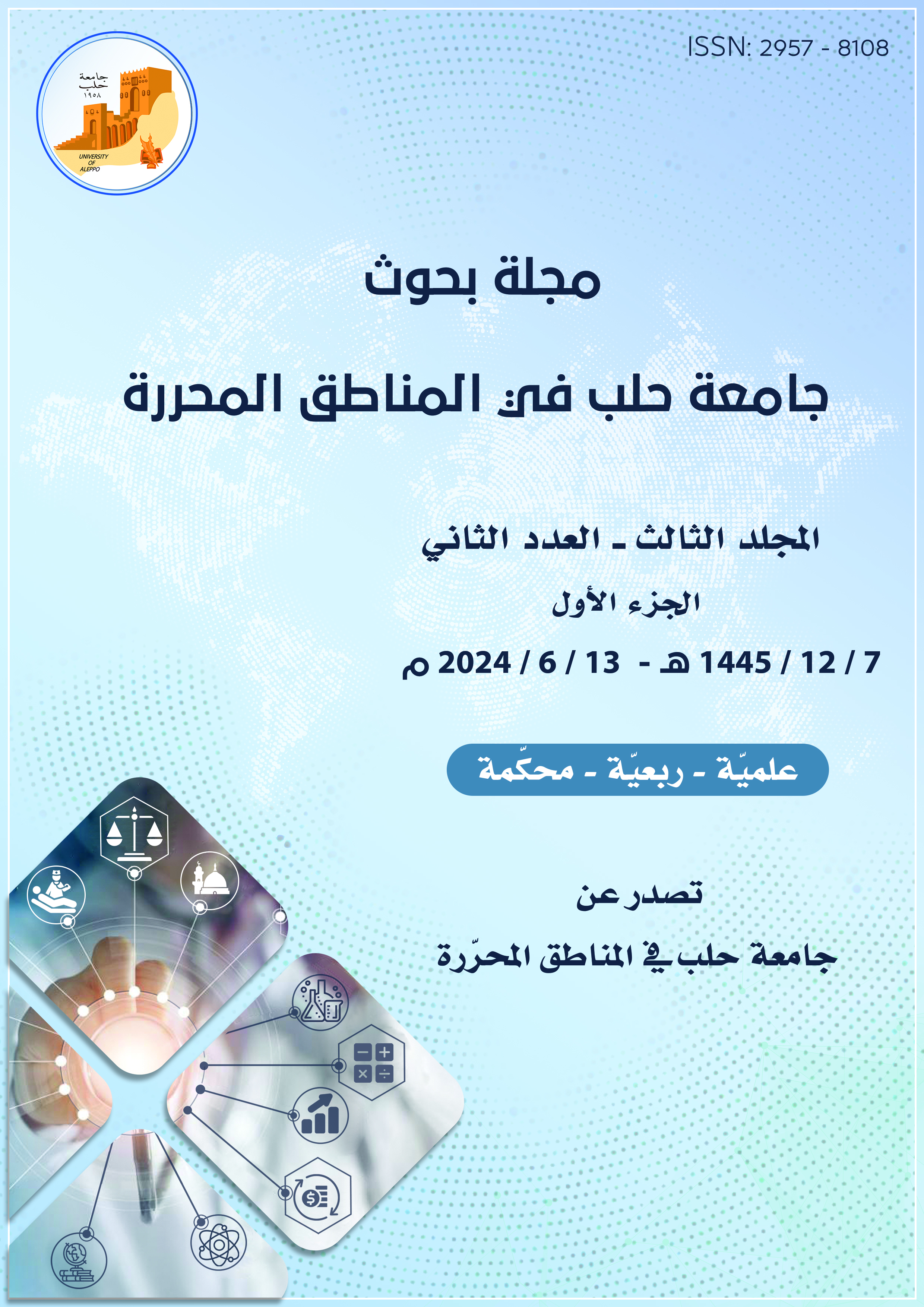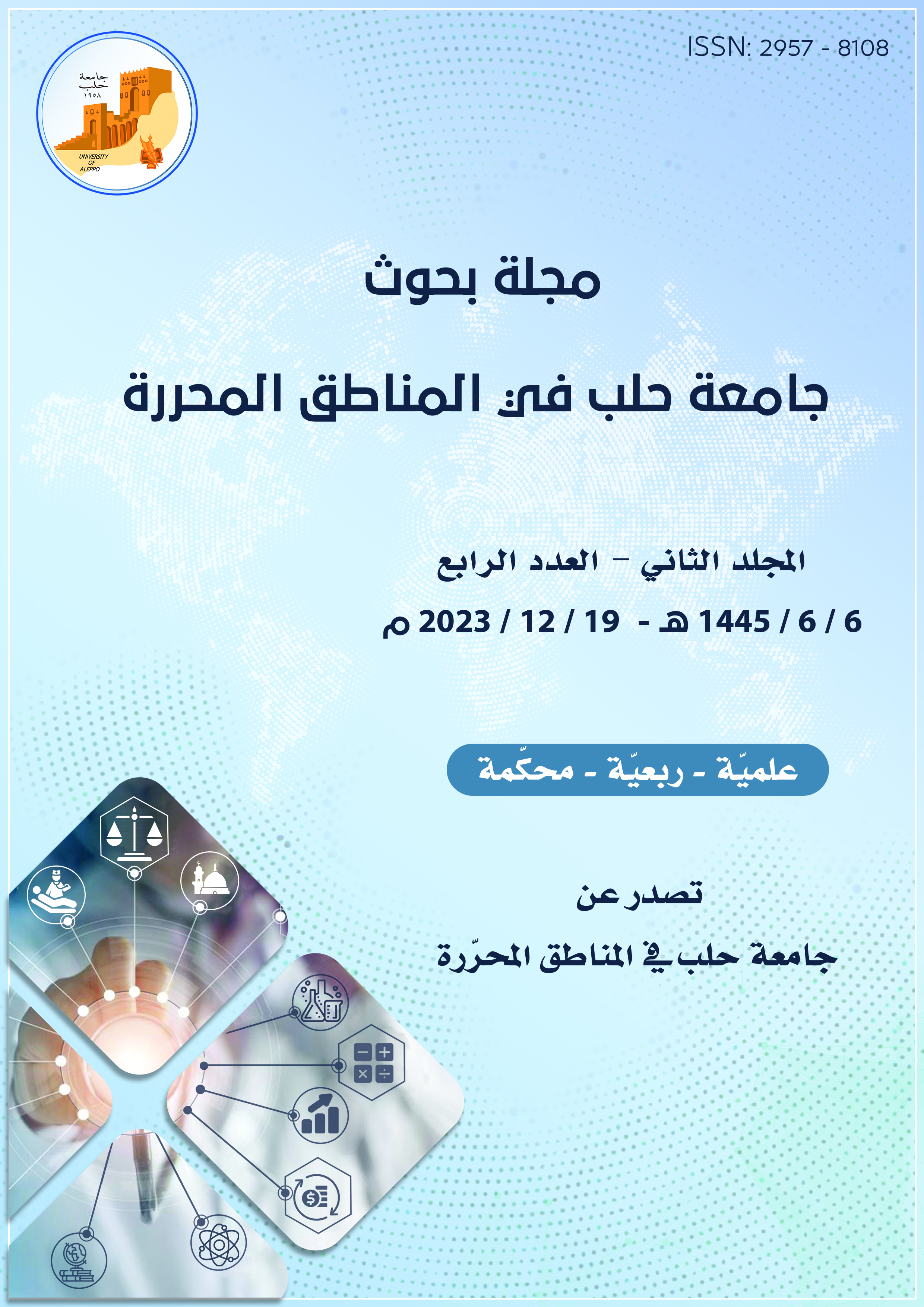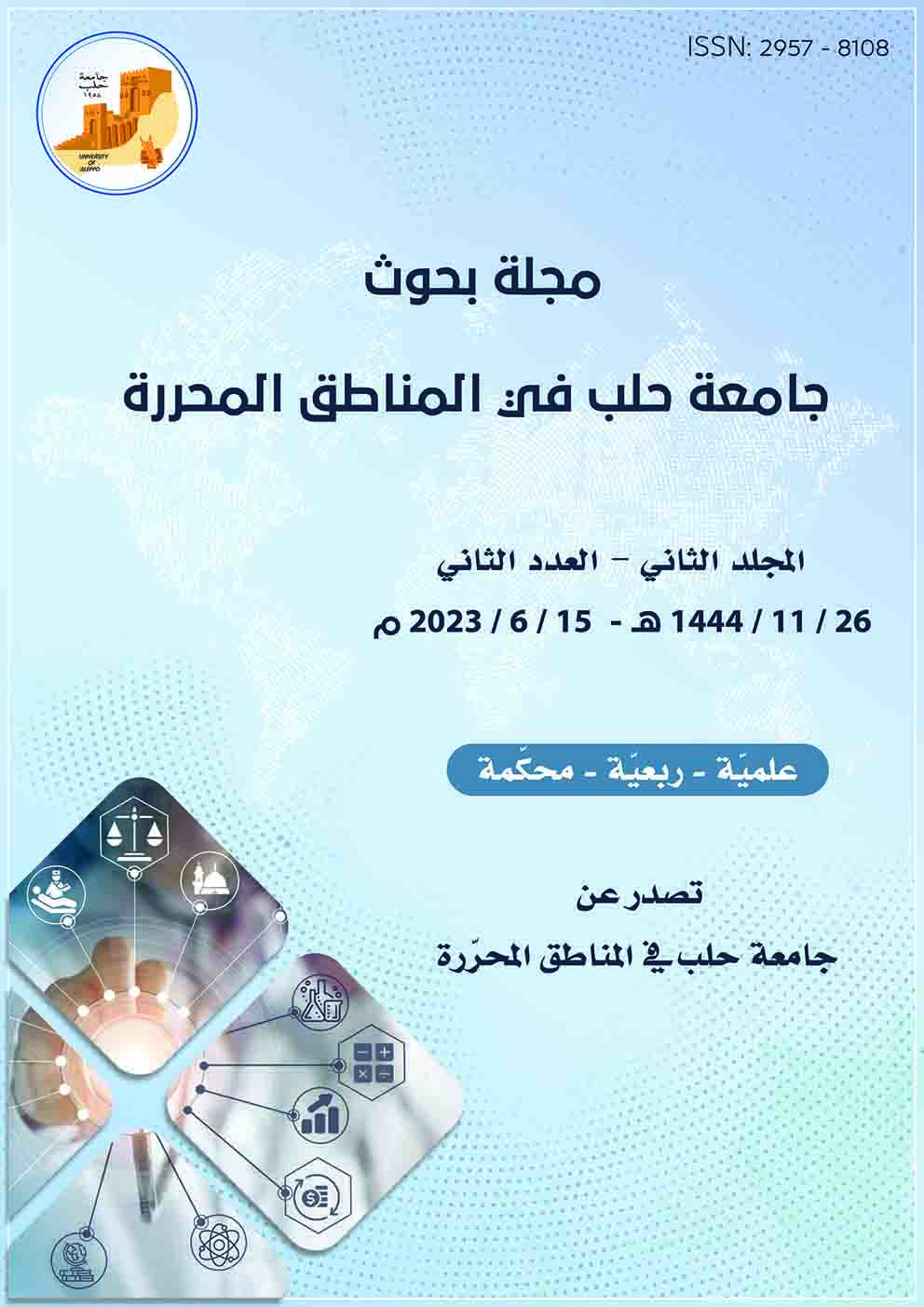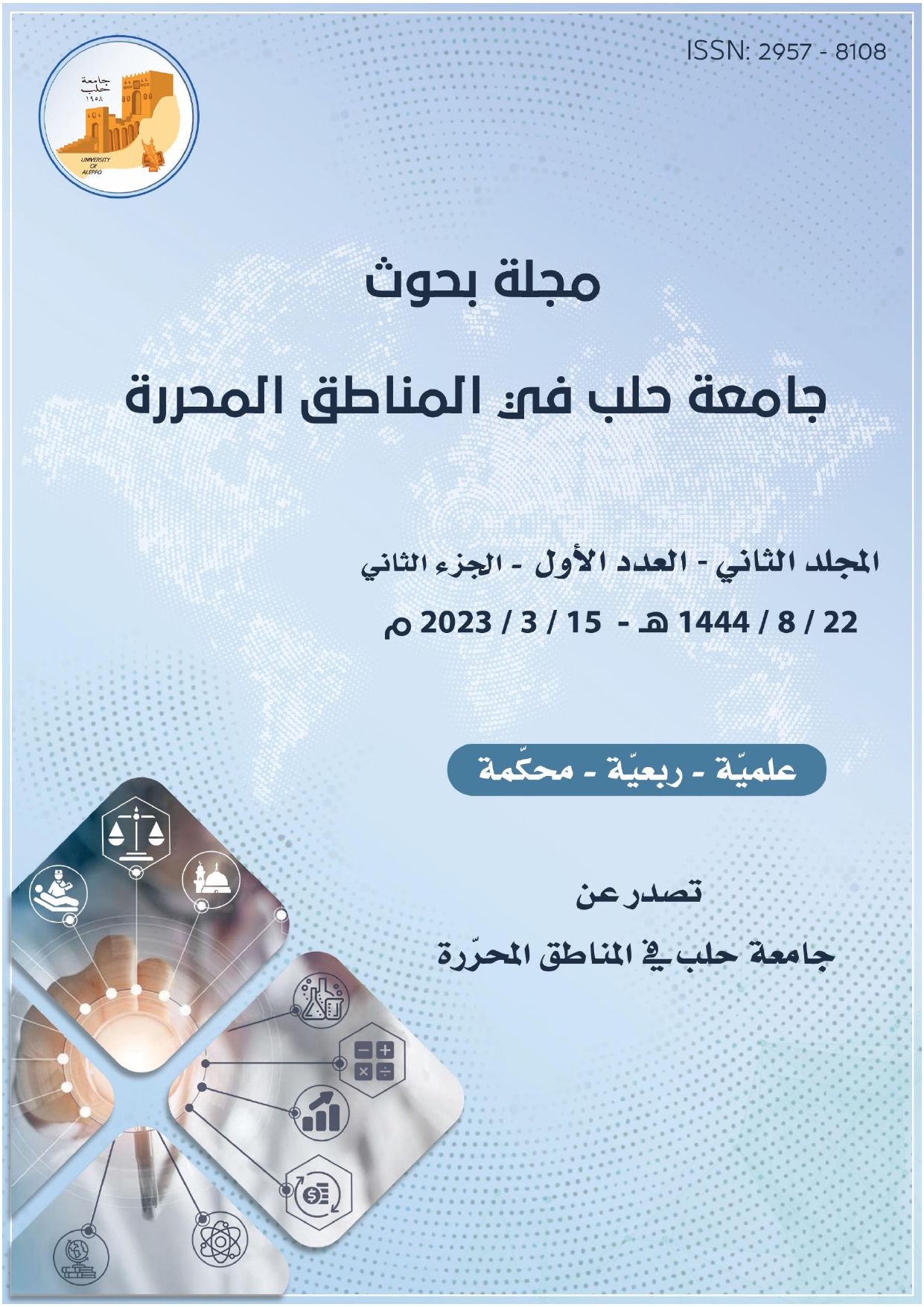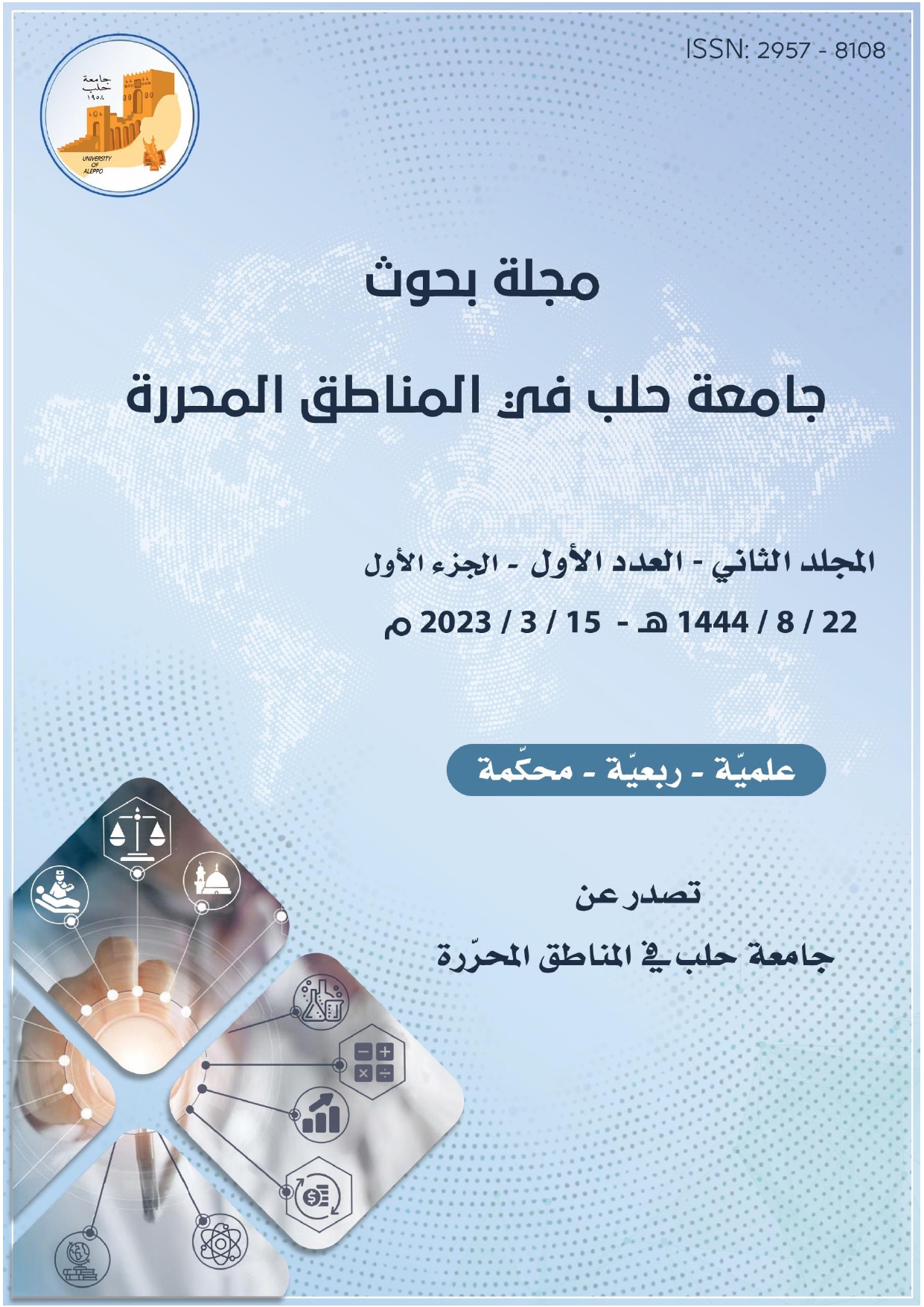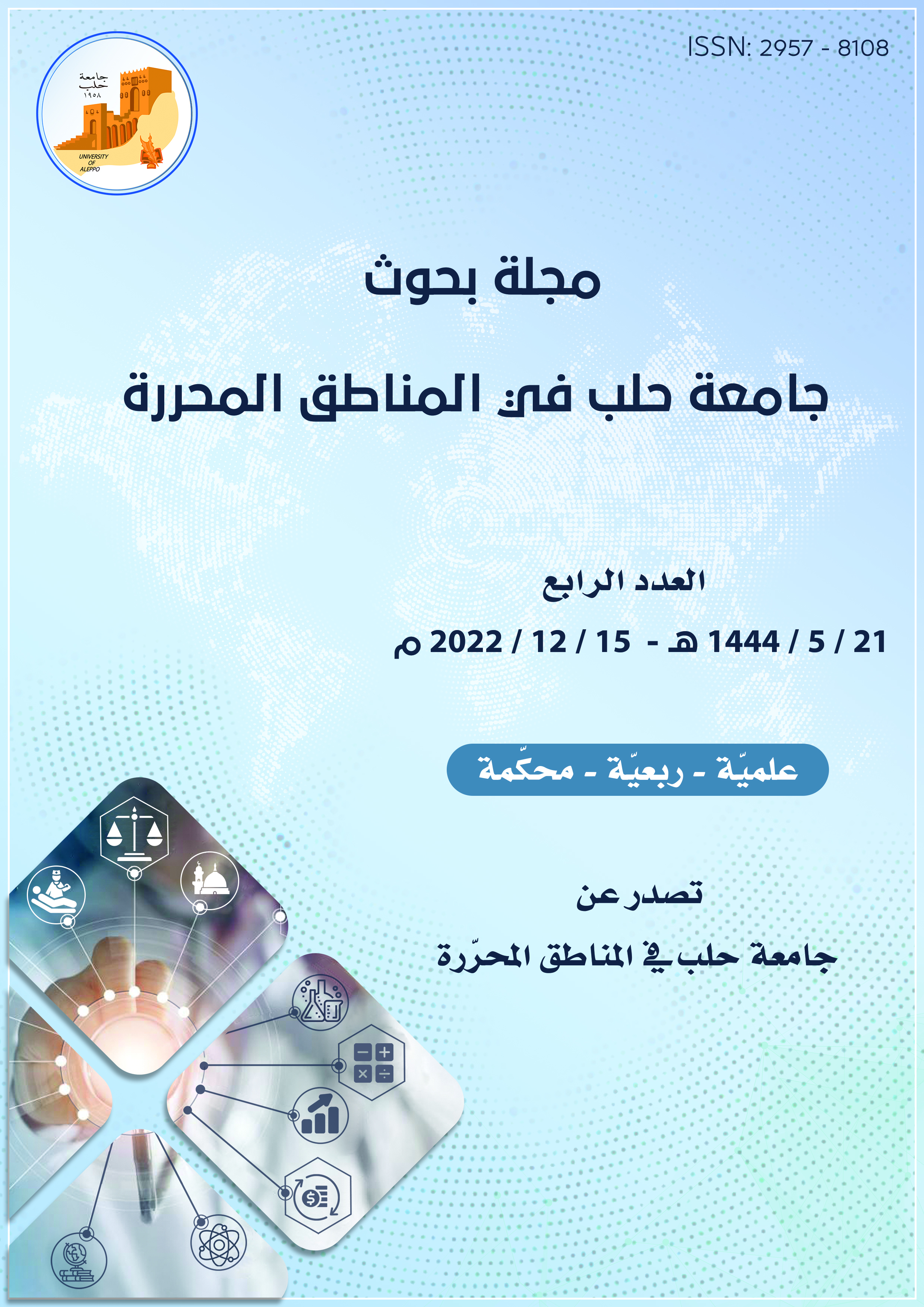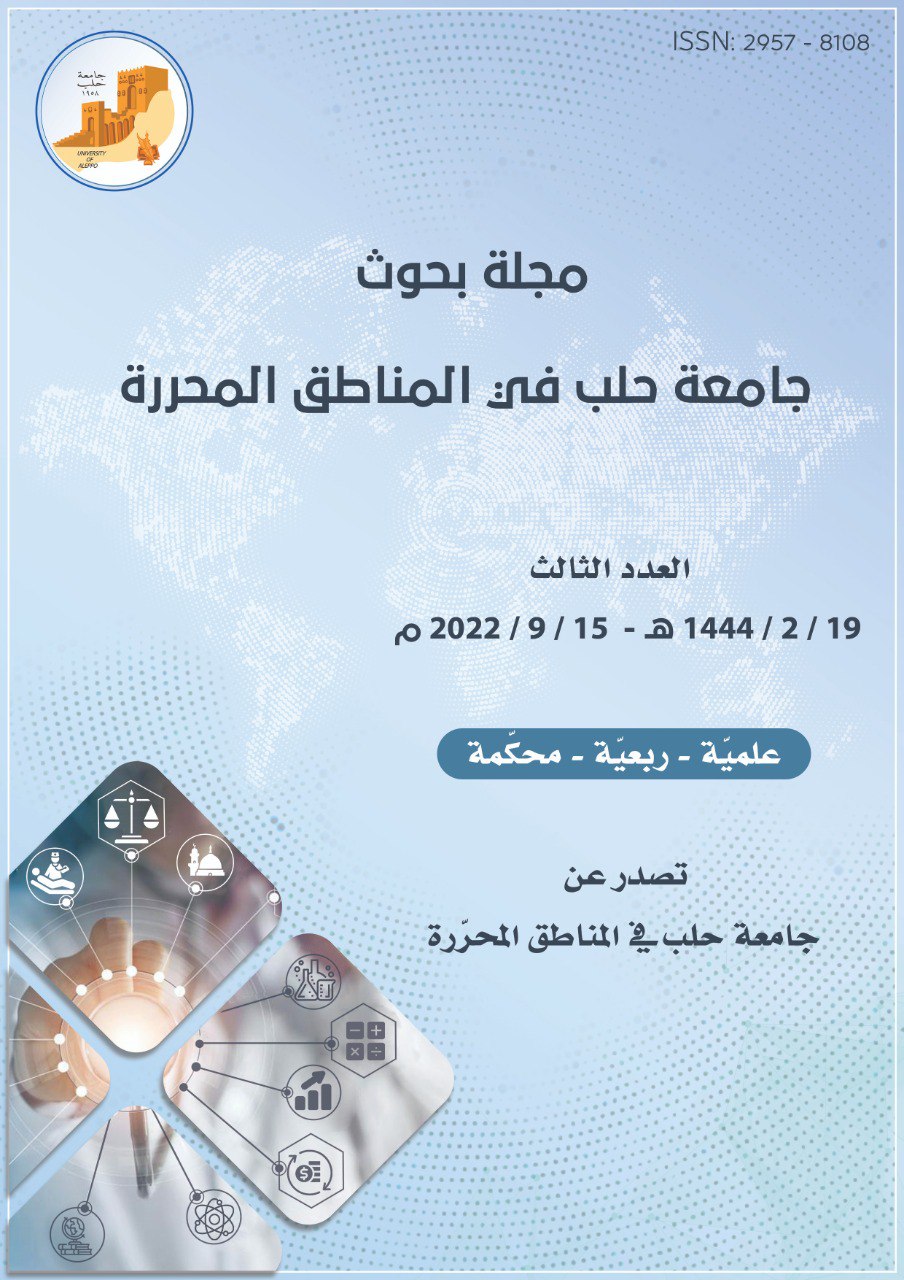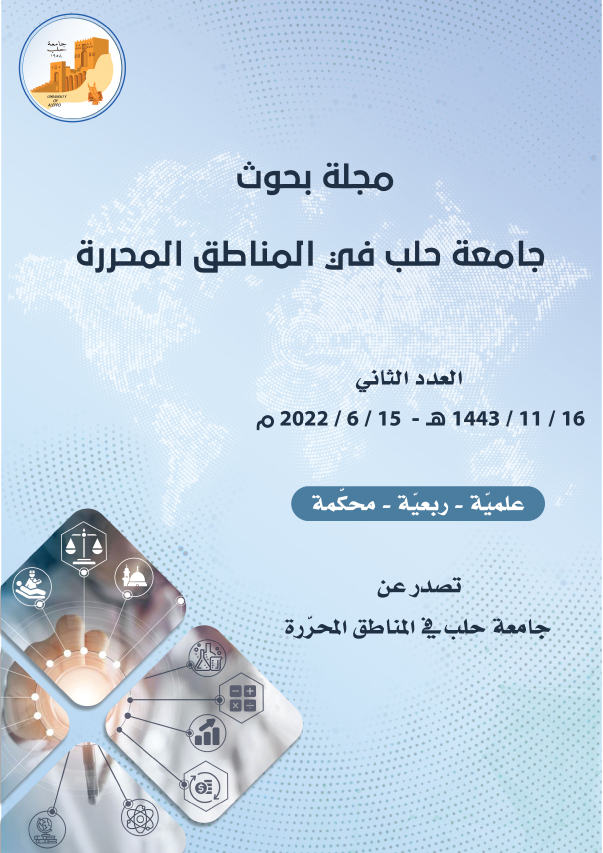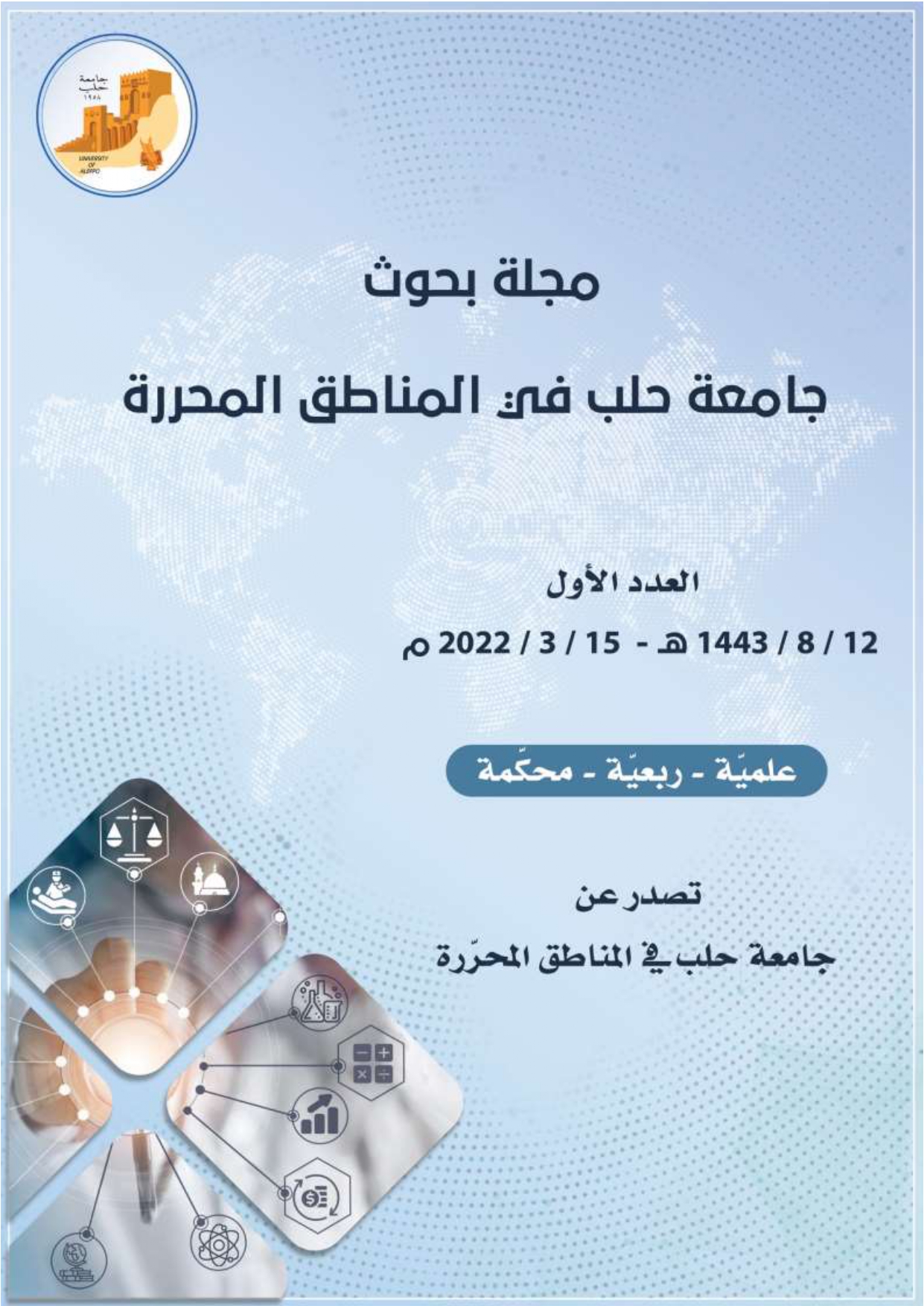prepared by:
Mr. Muhammad Faisal Al-Naji prof. Dr. Imad Khattab
Abstract
This research aimed to show the effect of supplemental irrigation on wheat productivity and yield components of durum wheat variety (Bahout 9). where the research was carried out in the Afrin area – Jindires village, which is one of the first settlement areas for the agricultural season 2020-2021 AD. The experiment was designed according to a completely randomized block design RCBD with three replications, and the experimental plots were randomly distributed within each replicate.
The results also showed that T3 treatment (2 supplemental irrigation) had an average yield per unit area (5600) kg/ha, and it was significantly superior to the rest of the control treatments (rain irrigation) and T2 (1 supplemental irrigation) in the heading (spike) and flowering phase /5 hour/. While the second treatment T2 (1 supplemental irrigation) was significantly superior (4075 Kg/ha) to the control (rain irrigation) (3700 Kg/ha).
The results also showed a significant increase in each of the main spike length /cm, the area of the flag leaf/cm2, the number of grains/plant and the weight of grains/g/plant in the treatment of (2 supplementary irrigation) compared to (1 supplementary irrigation) and on the control (rain irrigation). There was a significant increase for the same indicators for the one supplemental irrigation T2 over the control (rain irrigation).
The results obtained from correlation coefficient analysis showed a significant relationship between yield (kg/ha) with each of the main spike length /cm, flag leaf length/cm, flag leaf width/cm, flag leaf area/cm2, number of spikes/plant, number of grains/ Main spike, number of grains/plant, weight of grains/main spike/g, weight of grains/plant/g, weight of 1000 grains/g, weight of grains/1m2/g.
We also found out that the use of supplementary irrigation, whether one or two supplemental irrigations for wheat variety (Bahout 9), entails a significant increase in productivity, especially when applying two supplementary irrigations, which amounted to 51.35%. This application is very important in overcoming all the dangerous factors related to the lack of rain, which surrounds rain-fed agriculture.
Keywords: Variety (Bahouth 9), Supplementary irrigation.
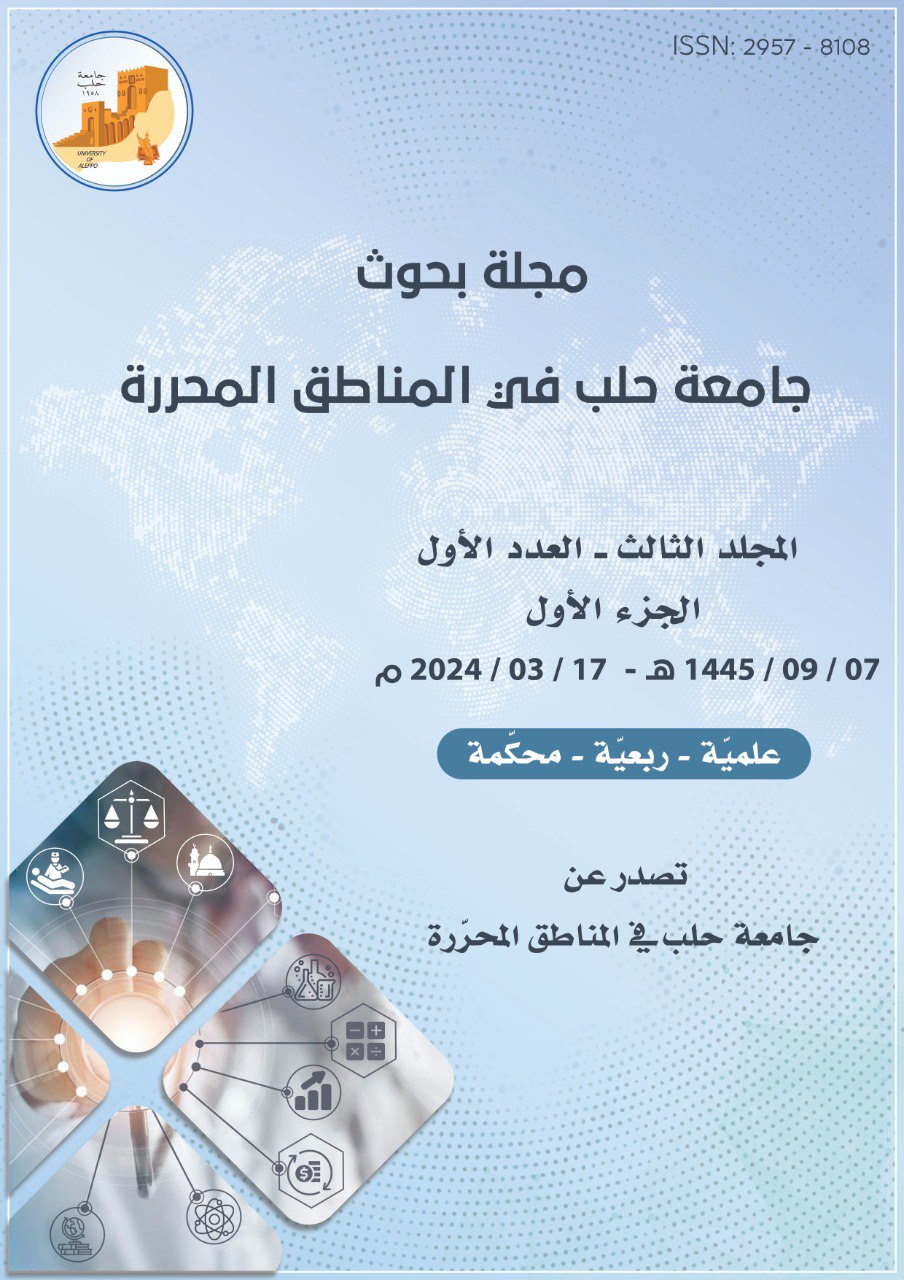
Share This research!
About the journal
A quarterly peer-reviewed scientific journal, issued in Arabic by a university in the liberated areas, the subject of scientific research and academic studies in various disciplines, in which the conditions of scientific research are applied in briefing and investigation and the methodology and steps of scientific research.
Latest articles
- Published On: 21/03/2024
- Published On: 21/03/2024
- Published On: 21/03/2024
- Published On: 21/03/2024
Read More
Publication year: 2024
Issue: 2.1
Author: أ. حسام إبراهيم
Publication year: 2024
Issue: 2.1
Author: أ. محمد العزام
Publication year: 2024
Issue: 2.1
Author: . هيفاء شيخ محمّد
Publication year: 2024
Issue: 2.1
Author: أ. أحمد ازعيتر
Publication year: 2024
Issue: 2.1
Author: أ. حسين الكنش
Publication year: 2024
Issue: 2.1
Author: أ. جابر فرحان السلامة
Publication year: 2024
Issue: 2.1
Author: أ. مؤمنة رياض السّكعة
Publication year: 2024
Issue: 2.1
Author: د. عبد الحكيم المصري
Publication year: 2024
Issue: 2.1
Author: أ. أحمد المحمود
Publication year: 2024
Issue: 2.1
Author: د. عبد الحي المحمود
Publication year: 2024
Issue: 1
Author: أ. أحمد عبيد العبيد
Publication year: 2024
Issue: 1
Author: Mr. Ahmad Obaid Al Obaid
Publication year: 2024
Issue: 1
Author: Mr. Öğrenci: Ahmed Obaid Al-Obaid
Publication year: 2024
Issue: 1
Author: أ.مصطفى أحمد عبد القادر
Publication year: 2024
Issue: 1
Author: Mr. Mustafa Ahmed Abdel Qader
Publication year: 2024
Issue: 1
Author: Mr. Sayın Mustafa Ahmed Abdel Qader
Publication year: 2024
Issue: 1
Author: أ. راقي السليمان
Publication year: 2024
Issue: 1
Author: Mr.Raqi Suleiman
Publication year: 2024
Issue: 1
Author: Mr. Rakı Süleyman
Publication year: 2024
Issue: 1
Author: أ.حسن عمر
Publication year: 2024
Issue: 1
Author: Mr.Hasan Omar
Publication year: 2024
Issue: 1
Author: Mr. Hasan Ömer
Publication year: 2024
Issue: 1
Author: أ.عماد الددو
Publication year: 2024
Issue: 1
Author: Mr. Imad Al-Dado
Publication year: 2024
Issue: 1
Author: Mr. İmad Al-Dado
Publication year: 2024
Issue: 1
Author: أ.خالد عبد الحميد الجراد
Publication year: 2024
Issue: 1
Author: Mr. Khaled Abdel Hamid Al-Jarad
Publication year: 2024
Issue: 1
Author: Mr. Halid Abdel Hamid Al-Jarad
Publication year: 2024
Issue: 1
Author: أ. بديع محمد ماهر العمر
Publication year: 2024
Issue: 1
Author: Mr. Badi Muhammad Maher Al-Omar
Publication year: 2024
Issue: 1
Author: Mr. Badi Muhammed Maher Al-Omar
Publication year: 2024
Issue: 1
Author: أ. محمد الياسين
Publication year: 2024
Issue: 1
Author: Mr. Muhammad Al-Yaseen
Publication year: 2024
Issue: 1
Author: Mr.Muhammed El-Yasin
Publication year: 2024
Issue: 1
Author: د. بدر الدين منلا الدخيل
Publication year: 2024
Issue: 1
Author: Dr. Badreddin Manla Al Dakhil
Publication year: 2024
Issue: 1
Author: Dr. Bedireddin Manla el-Dahhil
Publication year: 2024
Issue: 1
Author: أ. محمد الخليف
Publication year: 2024
Issue: 1
Author: Mr. Muhammad Al-Khalif
Publication year: 2024
Issue: 1
Author: Mr. Muhammed El Halife
Publication year: 2024
Issue: 1
Author: أ. محمد فيصل الناجي
Publication year: 2024
Issue: 1
Author: Mr. Muhammad Faisal Al-Naji
Publication year: 2024
Issue: 1
Author: Mr. Muhammed Faysal El-Naji
Publication year: 2023
Issue: 4
Author: أ.عبد الله عوض الزيدان
Publication year: 2023
Issue: 4
Author: Mr. Abdullah Awad Al-Zeidan
Publication year: 2023
Issue: 4
Author: Sayın. Abdullah Awad Al-Zaydan
Publication year: 2023
Issue: 4
Author: Mr. Engineer Mohammad Abaz
Publication year: 2023
Issue: 4
Author: Sayın. Muhammad Abaz
Publication year: 2023
Issue: 4
Author: أ.محمد أباز
Publication year: 2023
Issue: 4
Author: Dr. Badreddin MANLA AL DAKHIL
6 Şubat 2023’te Suriye’nin kuzeybatısında meydana gelen Türkiye-Suriye depreminin ön değerlendirmesi
Publication year: 2023
Issue: 4
Author: Dr. Badreddin MANLA AL DAKHIL
Publication year: 2023
Issue: 4
Author: د. بدر الدين منلا الدخيل
Publication year: 2023
Issue: 4
Author: Mr. Mamoun Orabi
Publication year: 2023
Issue: 4
Author: أ.مأمون عرابي
Publication year: 2023
Issue: 4
Author: أ.مأمون عرابي
Publication year: 2023
Issue: 4
Author: Mr. Hisham Al-Sheikh
Publication year: 2023
Issue: 4
Author: Sayın. Hisham Al-Sheikh
Publication year: 2023
Issue: 4
Author: أ.هشام الشيخ
Publication year: 2023
Issue: 4
Author: Mr. Mahmoud Al-Ash
Publication year: 2023
Issue: 4
Author: Sayın. Mahmud El-Aş
Publication year: 2023
Issue: 4
Author: أ.محمود الأش
Publication year: 2023
Issue: 4
Author: Mr. Badi Muhammad Maher Al-Omar
Publication year: 2023
Issue: 4
Author: Sayın. Badi Muhammed Maher El Ömer
Publication year: 2023
Issue: 4
Author: أ.بديع محمد ماهر العمر
Publication year: 2023
Issue: 4
Author: Mr.Abdul Rahman Al-Youssef
Publication year: 2023
Issue: 4
Author: Sayın. Abdul Rahman Al-Yousef
Publication year: 2023
Issue: 4
Author: أ.عبد الرحمن اليوسف
Publication year: 2023
Issue: 4
Author: Mr.Saleem Al-Sheikh
Publication year: 2023
Issue: 4
Author: Sayın. Salim Abdel Karim Şeyh
Publication year: 2023
Issue: 4
Author: أ.سليم عبد الكريم الشيخ
Publication year: 2023
Issue: 4
Author: Mrs. Asiya Al-Yahya
Publication year: 2023
Issue: 4
Author: Sayın. Asiya Al-Yahya
Publication year: 2023
Issue: 4
Author: آ. آسية اليحيى
Publication year: 2023
Issue: 4
Author: Mr. Muhammad Khaled Al-Shuwaiti
Publication year: 2023
Issue: 4
Author: Sayın. Muhammed Halid Al-Şuveti
Publication year: 2023
Issue: 4
Author: أ.محمد خالد الشويتي
Publication year: 2023
Issue: 3
Author: Mr. Dima Boulad
Publication year: 2023
Issue: 3
Author: Öğr. Gör. Dima Bolad
Publication year: 2023
Issue: 3
Author: آ. ديمه بولاد
Publication year: 2023
Issue: 3
Author: Mr. Abdullah Zubair Al-Ali Al-Abd
Publication year: 2023
Issue: 3
Author: Öğr. Gör. Abdullah Zubayir Al-Ali Al-Abd
Publication year: 2023
Issue: 3
Author: أ. عبد الله زبير العلي العبد
Publication year: 2023
Issue: 3
Author: Mr. Hamza Ahmed
Publication year: 2023
Issue: 3
Author: Öğr. Gör. Hamza Ahmed
Publication year: 2023
Issue: 3
Author: أ. حمزة أحمد
Publication year: 2023
Issue: 3
Author: Mr. Abdul Rahman Hassan Weys
Publication year: 2023
Issue: 3
Author: Öğr. Gör. Abdurrahman Hasan Veys
Publication year: 2023
Issue: 3
Author: أ. عبد الرّحمن حسن ويس
Publication year: 2023
Issue: 3
Author: Mr. Ahmed Riad Hamsho
Publication year: 2023
Issue: 3
Author: Öğr. Gör. Ahmed Riyad Hamşo
Publication year: 2023
Issue: 3
Author: أ. أحمد رياض حمشو
Publication year: 2023
Issue: 3
Author: Mr. Mustafa Al-Issa Termanini
Publication year: 2023
Issue: 3
Author: Öğr. Gör. Mustafa Al-İsa Termanini
Publication year: 2023
Issue: 3
Author: أ. مصطفى العيسى ترمانيني
Publication year: 2023
Issue: 3
Author: Ms .Zainab Abdel Aziz Bakour
Publication year: 2023
Issue: 3
Author: Öğr. Gör. Zeynab Abdulaziz Bakkur
Publication year: 2023
Issue: 3
Author: آ. زينب عبد العزيز بكور
Publication year: 2023
Issue: 3
Author: Dr. Abdul Rahman Azizi
Publication year: 2023
Issue: 3
Author: Dr. Abdurrahman Azizi
Publication year: 2023
Issue: 3
Author: د. عبد الرحمن عزيزي
The effect of evidence in determining what is meant by the imperative form and metaphorical meanings
Publication year: 2023
Issue: 3
Author: Mr. Salim Abdul Karim Sheikh
Publication year: 2023
Issue: 3
Author: Salim Abdul Kerim Al-Şeyh
Publication year: 2023
Issue: 3
Author: أ. سليم عبد الكريم الشيخ
Publication year: 2023
Issue: 3
Author: Mr. Muhammad Khaled Al-Shuwaiti
Publication year: 2023
Issue: 3
Author: Öğr. Gör. Muhammed Halid Al-Şuveti
Publication year: 2023
Issue: 3
Author: أ. محمد خالد الشويتي
Publication year: 2023
Issue: 3
Author: Mr. Mahmoud Al-Ash
Publication year: 2023
Issue: 3
Author: Mahmud El-Aş
Publication year: 2023
Issue: 3
Author: أ. محمود الأش
Publication year: 2023
Issue: 2
Author: Ammar Hamsho
Publication year: 2023
Issue: 2
Author: Ammar Hamşo
Publication year: 2023
Issue: 2
Author: عمار حمشو
Publication year: 2023
Issue: 2
Author: أكرم إدريس حاج موسى
Publication year: 2023
Issue: 2
Author: Akram haj mousa
Publication year: 2023
Issue: 2
Author: Ekrem İdris Hacı Musa
Publication year: 2023
Issue: 2
Author: إياد السطوف
Publication year: 2023
Issue: 2
Author: Iyad Al-Sattouf
Publication year: 2023
Issue: 2
Author: İyad Al-Sattuf
Publication year: 2023
Issue: 2
Author: محمّد عدنان المصطفى
Publication year: 2023
Issue: 2
Author: Mr. Muhammad Adnan Al-Mustafa
Publication year: 2023
Issue: 2
Author: Okt. Muhammed Adnan EL-MUSTAFA
Publication year: 2023
Issue: 2
Author: عادل الجوير
Publication year: 2023
Issue: 2
Author: Mr. Adel Al-Juwair
Publication year: 2023
Issue: 2
Author: Okt. Adel Al-Juvayir
Publication year: 2023
Issue: 2
Author: أحمد حمشو
Publication year: 2023
Issue: 2
Author: Mr. Ahmed Hamsho
Publication year: 2023
Issue: 2
Author: Okt. Ahmed Hamşo
Publication year: 2023
Issue: 2
Author: جهاد مرعي
Publication year: 2023
Issue: 2
Author: Mr. Jihad Marei
Publication year: 2023
Issue: 2
Author: Okt. Cihat Marei
Publication year: 2023
Issue: 2
Author: نورس العبد الله
Publication year: 2023
Issue: 2
Author: Mr . Nawras Al-Abdullah
Publication year: 2023
Issue: 2
Author: Okt. Navras Al-Abdullah
Publication year: 2023
Issue: 1
Author: Hasan Arshafi
Publication year: 2023
Issue: 1
Author: Hasan Irşafi
Publication year: 2023
Issue: 1
Author: حسن ارشافي
Publication year: 2023
Issue: 1
Author: Luay Eido
Publication year: 2023
Issue: 1
Author: Luay İdo
Publication year: 2023
Issue: 1
Author: لؤي عيدو
Publication year: 2023
Issue: 1
Author: Hanan Hammadi
Publication year: 2023
Issue: 1
Author: حنان حمادي
Publication year: 2023
Issue: 1
Author: Amer Taher Yassin Shaaban
Publication year: 2023
Issue: 1
Author: Amer Tahir Şaban
Publication year: 2023
Issue: 1
Author: عامر طاهر شعبان
Publication year: 2023
Issue: 1
Author: Rakan Al-Fajr
Publication year: 2023
Issue: 1
Author: Rakan Al-Fajr
Publication year: 2023
Issue: 1
Author: راكان الفجر
Publication year: 2023
Issue: 1
Author: Dr. Nasima Sheikh, Dr. Muhammad Zakaria Sheikh
Publication year: 2023
Issue: 1
Author: Dr. Nasima Şeyh, Dr. Muhammed Zakeriyya
Publication year: 2023
Issue: 1
Author: د. نسيمة شيخ د. محمد زكريا شيخ
Publication year: 2023
Issue: 1
Author: Sakhr Muhammad Ali Getty
Publication year: 2023
Issue: 1
Author: Sahır Muhammed Ali gayti
Publication year: 2023
Issue: 1
Author: صخر محمد علي جيتي
Publication year: 2023
Issue: 1
Author: Ahmed Al-Hassan Al-Hamid
Publication year: 2023
Issue: 1
Author: Ahmed Al-Hasan Al-Hamid
Publication year: 2023
Issue: 1
Author: أحمد الحسن الحامد
Publication year: 2023
Issue: 1
Author: عبد الرحمن حسين
Publication year: 2023
Issue: 1
Author: د. محمد رامز كورج
Publication year: 2023
Issue: 1
Author: حنان حمادي
Publication year: 2023
Issue: 1
Author: د. مالك السليمان
Publication year: 2023
Issue: 1
Author: عبد المجيد بدوي
Publication year: 2023
Issue: 1
Author: عبد الرحيم محمد الزيادي
Publication year: 2023
Issue: 1
Author: عماد محمد كعكو
Publication year: 2023
Issue: 1
Author: جلال مرعي العيسى
Publication year: 2022
Issue: 4
Author: مرهف العبد الله
Publication year: 2022
Issue: 4
Author: فاطمة بتور
Publication year: 2022
Issue: 4
Author: عبد العزيز نجار
Publication year: 2022
Issue: 4
Author: د. أحمد العمر
Publication year: 2022
Issue: 4
Author: عمار حسن الضبعان
Publication year: 2022
Issue: 4
Author: خالد الأحمد
Publication year: 2022
Issue: 4
Author: فادي الشعيب
Publication year: 2022
Issue: 4
Author: خالد أحمد الحسيان
Publication year: 2022
Issue: 4
Author: خالد أحمد الحسيان
Publication year: 2022
Issue: 4
Author: خالد أحمد الحسيان
Publication year: 2022
Issue: 3
Author: مرهف العبد الله
Publication year: 2022
Issue: 3
Author: عبد السلام زكريا
Publication year: 2022
Issue: 3
Author: د. بدر الدين منلا الدخيل
Publication year: 2022
Issue: 3
Author: صفاء جمعة
Publication year: 2022
Issue: 3
Author: عبد الرحمن اليوسف
Publication year: 2022
Issue: 3
Author: فادي الشعيب
Publication year: 2022
Issue: 2
Author: أحمد فائز نعناع
Publication year: 2022
Issue: 2
Author: جميل الحجي محمود
Publication year: 2022
Issue: 2
Author: أحمد الحسن الحامد
Publication year: 2022
Issue: 2
Author: يوسف صطوف عنان
Publication year: 2022
Issue: 2
Author: أبو النصر الدياب
Publication year: 2022
Issue: 2
Author: عبد السلام زكريا
Publication year: 2022
Issue: 2
Author: ظافر دعبول
Publication year: 2022
Issue: 1
Author: محمد عطا الكدع
Publication year: 2022
Issue: 1
Author: محمد مرعي
Publication year: 2022
Issue: 1
Author: د. بدر الدين منلا الدخيل
Publication year: 2022
Issue: 1
Author: عبد المالك الضاهر
Publication year: 2022
Issue: 1
Author: جميل الحجي محمود
Publication year: 2022
Issue: 1
Author: محمود المصطفى
Publication year: 2022
Issue: 1
Author: Mahmud Al-Mustafa
Publication year: 2022
Issue: 1
Author: محمود المصطفى
Publication year: 2022
Issue: 1
Author: Dr. Anas Khaled Al-Shabib
Publication year: 2022
Issue: 1
Author: Dr. Anas Halid Al-Şabib
Publication year: 2022
Issue: 1
Author: د. أنس الشبيب
Publication year: 2022
Issue: 1
Author: Zakaria Al-Khalif, Dr. Mohamed Rashid
Publication year: 2022
Issue: 1
Author: زكريا الخليف
